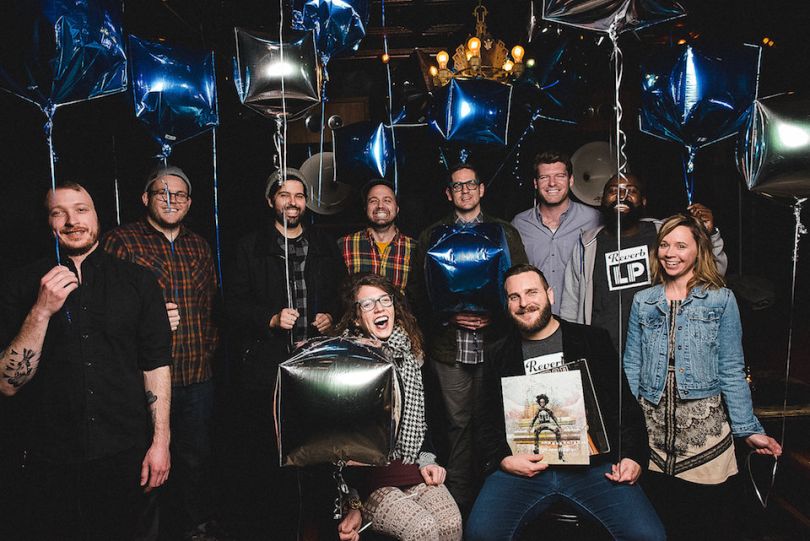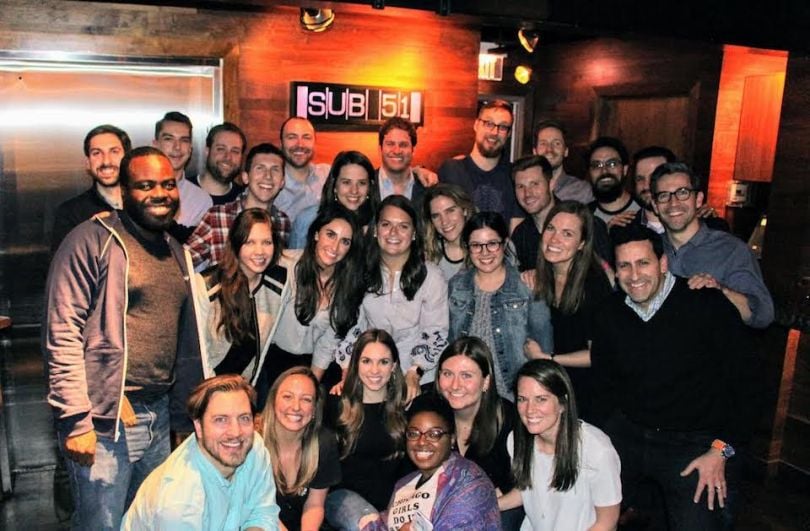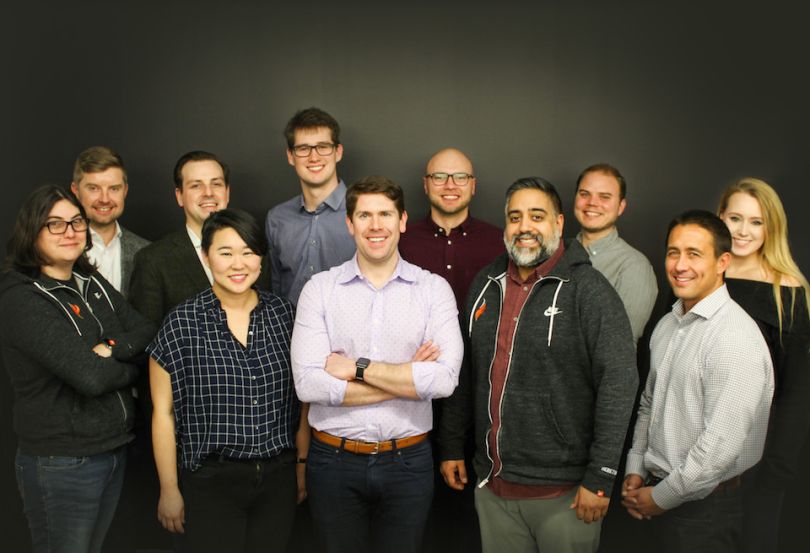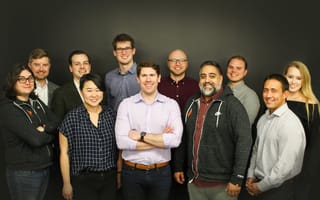While this may come as a shock to some, the opportunity to play ping pong and drink beer during office hours is rarely why people leave corporate life behind for the tech world. For many, the draw is the ability to make an instant impact with their work at companies whose cultures values new ideas and approaches.
But don’t take our word for it. We spoke to six Chicago technologists who all worked in corporate America to learn more about why they left it all behind to join fast-growing tech companies.

Reverb.com is a marketplace for musical equipment and instruments. The company recently launched a second marketplace, Reverb LP, for physical music media. Ernest Wilkins is Reverb LP’s marketing manager, and one of the things he most enjoyed about his move away from the corporate world is the ability to see the impact his work is making in real time.
What about the tech world made you want to leave the corporate life behind?
When you’re part of a large, corporate organization — no matter how innovative or forward-thinking it is — you’re often creating things and working on projects that may not come to fruition for months or even years. In my current position, every decision I make has a direct, visible impact. Reverb, in particular, prioritizes flexibility and values the creativity that comes with the ability to try new things and take risks. It’s extremely rewarding to see a direct correlation between the work I’m doing and the company’s growth.
It’s extremely rewarding to see a direct correlation between the work I’m doing and the company’s growth.”
What do you enjoy most about your current role, and have there been any unexpected surprises or challenges?
Reverb.com has created more than a platform for buying and selling gear: It’s created a trusted brand and a community where musicians come to learn, explore and connect. I’m tasked with building a new brand, one that speaks to not only musicians but also a broader group of music lovers who may not play an instrument but who love and appreciate physical music. It’s challenging, but exciting. I’m making decisions today about the brand’s voice, look and feel that will be used as a reference for years to come.
How does the culture at Reverb differ from the corporate environment?
First, it’s empowering to work at a company where people truly love what they’re doing. Nearly 85 percent of Reverb employees are musicians, and everyone who works here loves and appreciates music. Everyone not only sees the impact of their work, but they are also motivated by the fact that what we’re doing is putting more music out into the world.
In addition, hierarchies are essentially nonexistent. Whether you’re an intern or the head of the department, you’re expected to step up, voice your opinion and constantly be thinking through ways to better our platforms. Regardless of your department or title, your ideas are actually taken seriously. The company’s openness to ideas and ability to be flexible allows us to come up with creative solutions that can be implemented quickly.

UrbanBound’s software is designed to make it easier for companies to manage and administer relocation benefits. COO Ryan Kifus and VP of Sales Chris Collins didn’t relocate to join the company, but the two shared similar reasons for jumping at the chance to enter the tech world.
What about the tech world made you want to leave the corporate life behind?
Kifus: The biggest thing that drew me to the tech world was the ability to make an impact quickly. My corporate life revolved around process, policy and structure. It was hard to be heard, and things were slow to change. I came from a pretty archaic industry and was excited by the the idea that technology, specifically UrbanBound’s relocation technology, could help solve some of the biggest challenges I faced at my corporate job.
Collins: I wanted the opportunity to be a part of defining a company's strategy, and working for a small firm affords me the chance to create real impact. I'm excited every day to see how quickly we can put ideas into motion across all departments.
The people here are smart and driven, and everyone has a voice and the ability to make a difference.”
What do you enjoy most about your current role, and have there been any unexpected surprises or challenges?
Kifus: The best things are the culture and the people. There’s a true team atmosphere and an “all hands on deck” mentality. The people here are smart and driven, and everyone has a voice and the ability to make a difference. The biggest challenge I’ve faced is trying to erase the corporate mentality I’ve been building up for the last 15 years.
Collins: When working for a larger company, the path to success has already been defined by those who came before you. However, at an early stage company, you're building something that never existed before. This requires being OK with failing. It's part of the process, but when you do win, it's much more gratifying.
How does the culture at UrbanBound differ from the corporate environment?
Kifus: Here, titles don’t matter. In the corporate world, if you had the title, it meant you alone had the answer. Anyone can have the answer at UrbanBound. At my corporate job, nothing was collaborative. You just put your head down and did your job. You had no idea what was going on in other departments. Everyone was a piece of the puzzle, but nobody ever saw what the whole puzzle was supposed to be. At UrbanBound, if you have a good idea, the company listens. We truly are a family. We have fun together inside and outside the office, and that’s a feeling I rarely experienced in over 15 years in corporate America.
Collins: My previous employer had an incredible culture, and UrbanBound is no different. I've been fortunate enough to be surrounded by intelligent and fun people, many of whom have become lifelong friends. Both companies place a great emphasis on building a culture that's inclusive, fun and celebrates success.
Braviant Holdings combines proprietary technology with advanced analytics to provide loans to those who have been turned away by traditional lenders. Chief Architect Jeff Czaplewski and Senior UX Developer Anthony Artese both weighed in on the experience of leaving the corporate world behind to join a fast-growing fintech startup.
What about the tech world made you want to leave the corporate life behind?
Czaplewski: In a corporate environment, you're sometimes constrained by the technology the rest of IT is using, so exploring new tech or ideas can be a difficult and lengthy process. Here at Braviant, we are the IT of the company — 14 strong and growing — so we're setting the direction and choosing those technologies at a pace that meets our ever-expanding business needs. We're also relying on our experience from large companies to instill professionalism and best practices but not stifle any creativity.
Artese: In the corporate world, you often have to operate within very rigid constraints. I was looking for more freedom to explore, evaluate and implement new technologies that will help solve problems that the business is facing.
We are all enabled to make decisions quickly because we are not dealing with layers of red tape.”
What do you enjoy most about your current role, and have there been any unexpected surprises or challenges?
Czaplewski: I really enjoy the relationship between the business and the technology teams. We're working to help the business grow and succeed, and the decisions we make together on a daily basis have a direct impact on the business. From prioritization to build and deploy, everything impacts the business and you see the impact your efforts are having. Sometimes in a corporate environment your efforts are diluted or lost in translation as they're reported up the chain, which can be demotivating.
Artese: I really enjoy the level of responsibility and ownership I am given. After being here for less than a year, I've already had the opportunity to help design, build and launch a brand new product that is adding value to the business.
How does the culture at Braviant Holdings differ from the corporate environment?
Czaplewski: The culture here is more open and collaborative. If something needs to be decided, you literally can see everyone who needs to weigh in by just looking around. Getting people together and brainstorming a solution is just a matter of huddling for an hour or so. There’s no hiding behind emails or waiting for approvals to talk to other teams, just good direction and collaboration.
Artese: Braviant has a laid back, fun and positive environment that acknowledges and respects when teams or individuals need to be heads down solving problems. I found that type of balance was difficult to achieve in the corporate environment. We are all enabled to make decisions quickly because we are not dealing with layers of red tape.

Heretik’s software — which is built on top of Relativity’s e-discovery platform — uses machine learning to organize and analyze contracts to make the contract review process more efficient. Data scientist Jannie Chang was a corporate lawyer before joining the company. Whereas the legal industry discourages failure, for obvious reasons, the tech world embraces it as a learning opportunity. Chang said this has allowed her to be more creative and innovative in her work.
What about the tech world made you want to leave the corporate life behind?
When the economy crashed, the legal industry was under massive pressure to cut costs. It did so by laying off employees and eliminating positions. Everyone left were expected to double their already heavy workloads. I quickly found myself burnt out and started searching for something to reignite my passion for law. The tech world offers a means to eliminate mundane tasks and optimize substantive work, which is exactly what the legal industry needed. I decided I wanted to bring a technical perspective to legal problems, a legal perspective to technical solutions and ultimately be on the forefront of bringing these solutions to my peers in the legal community.
At Heretik, my team encourages me to try new things, to fail quickly and learn.”
What do you enjoy most about your current role, and have there been any unexpected surprises or challenges?
I mostly enjoy the team of unique individuals I work with every day. We’re all so different, filling different roles and bringing different perspectives, but still united by our mission to organize contract data across entire organizations for smarter, faster and more favorable decisions. It has been an unexpected challenge to ensure that I can bridge the gaps between data science, the engineering team and the business team, but also an unexpected surprise how rewarding and fun it’s been to not only bring a great product to the market but also to build a great company together.
How does the culture at Heretik differ from the corporate environment?
The most noticeable difference is the promotion of experimentation. As an attorney, time is costly and failure is not an option. There was so much pressure to get every move and every argument right, quickly and on the first try. As a result, the legal industry lives and breathes the “if it isn’t broken, don’t fix it” mantra. In contrast, at Heretik, my team encourages me to try new things, to fail quickly and learn. As a result, my projects are innovative and my approaches are much more creative.







